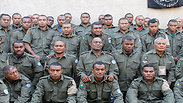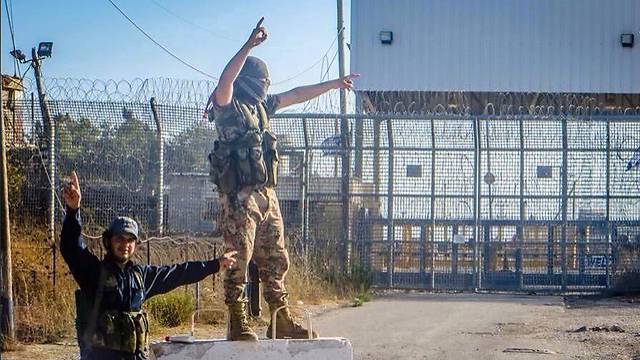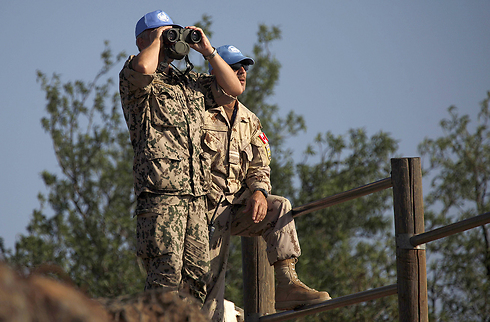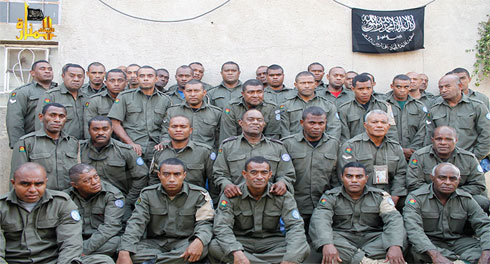
Islamist fighters who seized dozens of Fijian soldiers serving as UN peacekeepers on the Golan Heights last week are demanding that their group be removed from a global terrorism list and that compensation be paid for members killed in fighting, the head of Fiji's army said on Tuesday.
Brigadier-General Mosese Tikoitoga said negotiations had been stepped up between the al-Qaeda-linked Nusra Front and a new UN negotiation team now in place in Syria.
"The rebels are not telling us where the troops are, but they continue to reassure us they are being well-looked after," Tikoitoga told media in Suva. "They also told us they are ensuring that they are taken out of battle areas."
Heavy fighting erupted on Monday between the Syrian army and Islamist rebels near where 45 Fijian peacekeepers were captured and scores of their fellow blue helmets from the Philippines escaped after resisting capture. The number of Fijians captured had previously been put at 44.
The Nusra Front published a statement online on Sunday that included photos showing what it said were the captured Fijians, along with 45 identification cards. The group said the men were "in a safe place and in good health."
The statement mentioned no demands or conditions for the peacekeepers' release.
The Nusra Front accused the UN of doing nothing to help the Syrian people since the uprising against President Bashar Assad began in March 2011.
It said the Fijians were seized in retaliation for the UN's ignoring "the daily shedding of the Muslims' blood in Syria" and even colluding with Assad's army "to facilitate its movement to strike the vulnerable Muslims" through a buffer zone in the Golan Heights.
The group is one of the two most powerful extremist factions fighting in Syria's civil war, which the UN says has killed more than 190,000 people.
Syria's three-year civil war reached the frontier with Israeli-controlled territory last week when Islamist fighters overran a crossing point in the line that has separated Israelis from Syrians in the Golan Heights since a 1973 war.
The fighters then turned on the UN blue helmets from a peacekeeping force that has patrolled the ceasefire line for 40 years. After the Fijians were captured on Thursday, more than 70 Filipinos spent two days besieged at two locations before reaching safety.
Tikoitoga said the group was demanding compensation for three fighters killed in the confrontation with the UN peacekeepers, as well as humanitarian assistance to the people of Ruta, a stronghold of the group on outskirts of Damascus, and the removal of the organization from the UN list of banned terrorist organizations.
"We've been assured by UN headquarters that the UN will bring all its resources to bear to ensure the safe return of our soldiers," the Fijian army chief said.
Heavy fighting
The Syrian Observatory for Human Rights, which monitors violence in the Syrian civil war, said the Nusra Front and allied fighters were battling government forces near the Quneitra crossing and in the nearby village of al-Hamiydiah.
The Observatory said there were casualties on both sides. Observatory founder Rami Abdelrahman told Reuters the Nusra Front's aim appeared to be "to end once and for all the regime's presence in the area and it also appears that the goal is to expel the international observers".
The rebels' targeting of the UN mission has touched off criticism among some nations contributing troops to the peacekeeping force about how the Golan Heights operation functions.
Ireland, which contributes a 130-member armored rapid response unit to the UN mission, warned Monday it would not replace its troops next month if UN leaders in New York do not agree on strengthening the force's firepower, command and control, and rules of engagement.
"I've made it very clear that I'm not going to continue to commit Irish troops to this mission unless there's a very fundamental review of how it's going to operate. Clearly this is no longer a demilitarized zone," Irish Defense Minister Simon Coveney told RTE state radio in Dublin.
"We need to get a significant reassurance from the UN, and the Syrian side, that we can operate a mission safely. The risk levels, given what's happened over the last three days, are not acceptable."
He said Irish troops in armored vehicles exchanged fire with rebels Saturday as they rescued Filipino troops from one of the besieged border posts. The Indian-led, 1,250-member force includes soldiers from Fiji, India, Nepal, the Philippines and the Netherlands.
Coveney said the Irish unit remained on standby for a potential rescue of the seized Fijian troops. Ireland's current military deployment has been in the Golan Heights since March and is supposed to be replaced by other Irish soldiers next month.
An Irish withdrawal could deal a final blow to the UN mission, which has already seen Austria and Croatia pull their forces last year over fears they would be targeted. The Philippines, meanwhile, has said it would bring home its peacekeepers after their tour of duty ends in October.
The UN peacekeeping force in the area, known as UNDOF, includes 1,223 troops from India, Ireland, Nepal and the Netherlands as well as the Fijians and Filipinos who came under attack last week.
The United Nations has announced that the Philippines will pull out of UNDOF. Austria, Japan and Croatia have also pulled their troops out of the force because of the deteriorating security situation as the civil war in Syria reaches the Golan.
Reuters and the Associated Press contributed to this report


















